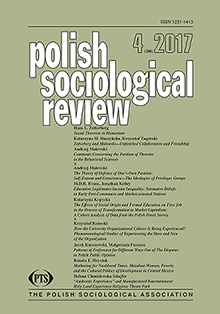Education Legitimates Income Inequality: Normative Beliefs in Early Post-Communist and Market-oriented Nations
Education Legitimates Income Inequality: Normative Beliefs in Early Post-Communist and Market-oriented Nations
Author(s): M.D.R. Evans, Jonathan KelleySubject(s): Education, Sociology
Published by: Polskie Towarzystwo Socjologiczne
Keywords: education; human capital; pay equity; income justice; legitimate earnings; East Central Europe; Communism
Summary/Abstract: Using data from large, representative national samples in in Poland, Hungary, Bulgaria, Australia, Finland, and the Netherlands, we examine moral norms about just rewards for education. Comparing these norms in East Central Europe shortly after Communism-where the dominant ideology was egalitarian, schooling free, rewards to education modest, and alternative investments absent-and in market-oriented societies where the opposite held, provides insight into the influence of institutional arrangements on moral norms. We find that the publics in all these countries favor large rewards for education (which legitimates substantial income inequality), showing that these moral norms are resilient to institutional arrangements. These results align with Aristotle's claim that people believe job performance merits reward because it makes valuable contributions. They undermine alternative theories: credentialism, radical egalitarianism, and the hegemonic power of dominant political elites. These results also undermine economists' human capital arguments insofar as they are seen as a moral justification for income inequality.
Journal: Polish Sociological Review
- Issue Year: 200/2017
- Issue No: 4
- Page Range: 441-464
- Page Count: 24
- Language: English

